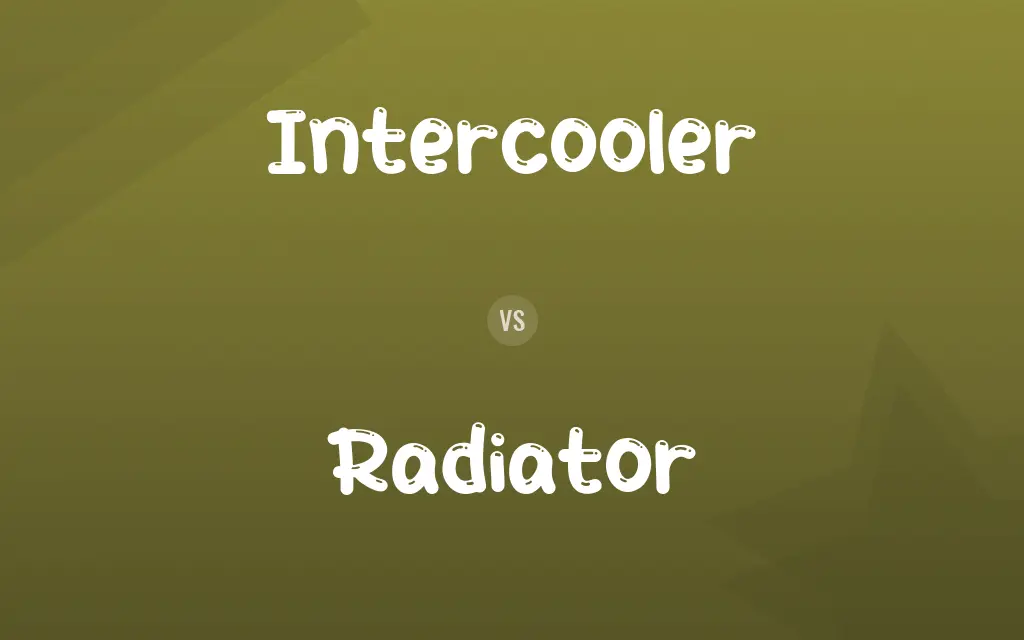Intercooler vs. Radiator: Difference and Comparison
Edited by Muazma Batool — By Muneeza Rehman — Published on April 9, 2024
An intercooler reduces the temperature of compressed air from a turbo/supercharger before it enters the engine, enhancing efficiency. A radiator cools engine coolant, dissipating heat from the engine to prevent overheating.

Difference Between Intercooler and Radiator
An intercooler is key in turbocharged and supercharged engines, cooling the air compressed by these components to increase air density and improve combustion efficiency. In contrast, a radiator is essential in all combustion engines, using a water-based coolant to transfer heat away from the engine block and maintain optimal operating temperatures.
Muneeza Rehman
Apr 09, 2024
An intercooler specifically targets the air charge entering the engine, enhancing performance and efficiency, a radiator focuses on regulating the engine's overall temperature to prevent overheating, which is crucial for engine longevity.
Muneeza Rehman
Apr 09, 2024
Intercoolers come in two main types: air-to-air and air-to-water, each with its own cooling mechanism for compressed air. Radiators, however, generally use a single principle, circulating coolant through fins to dissipate heat into the air.
Muneeza Rehman
Apr 09, 2024
The effectiveness of an intercooler directly influences an engine's power output by allowing for more dense air to enter the combustion chamber. Meanwhile, the radiator's efficiency is critical to preventing engine failure due to overheating, underscoring its role in engine health rather than performance enhancement.
Jonathan
Apr 09, 2024
Intercoolers are specifically associated with forced induction systems, not found in naturally aspirated engines. Radiators, on the other hand, are a universal component across both naturally aspirated and forced induction engines, showcasing their fundamental role in engine design.
Levi
Apr 09, 2024
Intercooler vs. Radiator Comparison Chart
Purpose
Cools compressed air from turbo/superchargers
Cools engine coolant to dissipate engine heat
Muneeza Rehman
Apr 09, 2024
Position in Vehicle
Typically mounted in front of the engine
Located at the front of the engine bay
Muneeza Rehman
Apr 09, 2024
Associated with
Turbocharged and supercharged engines
All combustion engines
Muneeza Rehman
Apr 09, 2024
Impact on Performance
Increases air density for better combustion
Prevents overheating to maintain engine performance
Muneeza Rehman
Apr 09, 2024
Intercooler vs. Radiator Definitions
◉Intercooler
Air-to-air and air-to-water.
The racing team chose an air-to-air intercooler for its simplicity and efficiency.
William
Feb 27, 2024
◉Radiator
A device that cools the engine by dissipating heat from coolant.
The car overheated because the radiator was leaking.
Muneeza Rehman
Feb 27, 2024
◉Intercooler
Mounted near the engine, often in front.
The intercooler's front-mounted position helps it catch more air while driving.
Lucas
Feb 27, 2024
◉Radiator
Maintains optimal engine temperature.
Installing a high-capacity radiator keeps the engine cooler under stress.
Lucas
Feb 27, 2024
◉Intercooler
Enhances combustion efficiency by cooling air.
With a new intercooler, the engine breathes better and runs more efficiently.
William
Feb 27, 2024
◉Radiator
Made of tubes and fins for heat exchange.
The radiator's fins increase the surface area for better heat dissipation.
Kaitlyn
Feb 27, 2024
◉Intercooler
Increases engine power output.
Upgrading the intercooler has significantly boosted the engine's horsepower.
William
Feb 27, 2024
◉Radiator
Fixed at the front of the engine bay.
The radiator is easily accessible for maintenance at its location.
Kaitlyn
Feb 27, 2024
◉Intercooler
A device for cooling air compressed by a turbocharger or supercharger.
The mechanic installed a larger intercooler to improve the car's performance.
Muneeza Rehman
Feb 27, 2024
◉Radiator
Essential for preventing engine overheating.
A malfunctioning radiator can lead to severe engine damage.
William
Feb 27, 2024
◉Intercooler
A device for cooling a fluid between successive heating stages.
Muneeza Rehman
Feb 27, 2024
◉Radiator
A heating device consisting of a series of pipes, typically inside an upright metal structure, through which steam or hot water circulates to heat the surrounding space by radiation or convection.
Muneeza Rehman
Feb 27, 2024
◉Intercooler
A heat-exchange device located between other devices or processes.
Muneeza Rehman
Feb 27, 2024
◉Radiator
A similar heating device based on other technology such as the generation of heat through electrical resistance.
Muneeza Rehman
Feb 27, 2024
Intercooler vs. Radiator Frequently Asked Questions
Why is an intercooler important for turbocharged engines?
It reduces the temperature of compressed air, increasing its density for improved power and efficiency.
Jonathan
Apr 09, 2024
What happens if the radiator fails?
Engine temperatures can rise excessively, potentially leading to overheating and engine damage.
William
Apr 09, 2024
Can a vehicle have both an intercooler and a radiator?
Yes, turbocharged or supercharged vehicles have both to cool compressed air and maintain engine temperature, respectively.
Muneeza Rehman
Apr 09, 2024
What type of coolant does a radiator use?
Radiators use a water-based coolant mixed with antifreeze to absorb and dissipate heat.
Muneeza Rehman
Apr 09, 2024
How does a radiator work?
It circulates coolant through the engine, absorbing heat and then dissipating it through fins exposed to air.
Muneeza Rehman
Apr 09, 2024
Are all intercoolers the same?
No, there are air-to-air and air-to-water intercoolers, each with different cooling efficiencies and applications.
Muneeza Rehman
Apr 09, 2024
What is the main function of an intercooler?
To cool down compressed air from turbo/superchargers before it enters the engine, enhancing air density and combustion efficiency.
Muneeza Rehman
Apr 09, 2024
Can upgrading the intercooler improve engine performance?
Yes, a more efficient intercooler can significantly enhance engine power and efficiency.
Henry
Apr 09, 2024
Does every car have an intercooler?
Only cars with turbocharged or supercharged engines have intercoolers.
Muneeza Rehman
Apr 09, 2024
Is the radiator's location important?
Yes, its front position ensures maximum air flow for optimal cooling efficiency.
Muneeza Rehman
Apr 09, 2024
Can a damaged radiator affect fuel efficiency?
Yes, because overheating can cause the engine to operate inefficiently, reducing fuel economy.
Henry
Apr 09, 2024
How do air-to-air and air-to-water intercoolers differ?
Air-to-air intercoolers use ambient air to cool the compressed air, while air-to-water intercoolers use a water circuit for cooling.
Muneeza Rehman
Apr 09, 2024
What maintenance does a radiator require?
Regular coolant changes, leak checks, and cleaning of the fins and passages are essential.
William
Apr 09, 2024
What materials are intercoolers and radiators made from?
Intercoolers are typically made from aluminum for its heat-conductive properties, while radiators can be aluminum or a mix of aluminum and plastic.
Muneeza Rehman
Apr 09, 2024
What are the signs of a failing intercooler?
Reduced engine performance, higher intake temperatures, and potentially visible damage or leaks.
Elijah
Apr 09, 2024
Content Creators
Written by
Muneeza RehmanAt Comparisons.wiki, Muneeza skillfully navigates the vast sea of information, ensuring clarity and accuracy as the lead content editor. With a keen eye for detail, she curates every comparison to enlighten and engage readers.
Edited by
Muazma BatoolAs a content editor, Muazma Batool is not just a grammar guru but a creative mastermind who breathes life into every word. With an eagle eye for detail and a passion for storytelling, she transforms bland text into engaging content that captivates audiences and drives results.

































